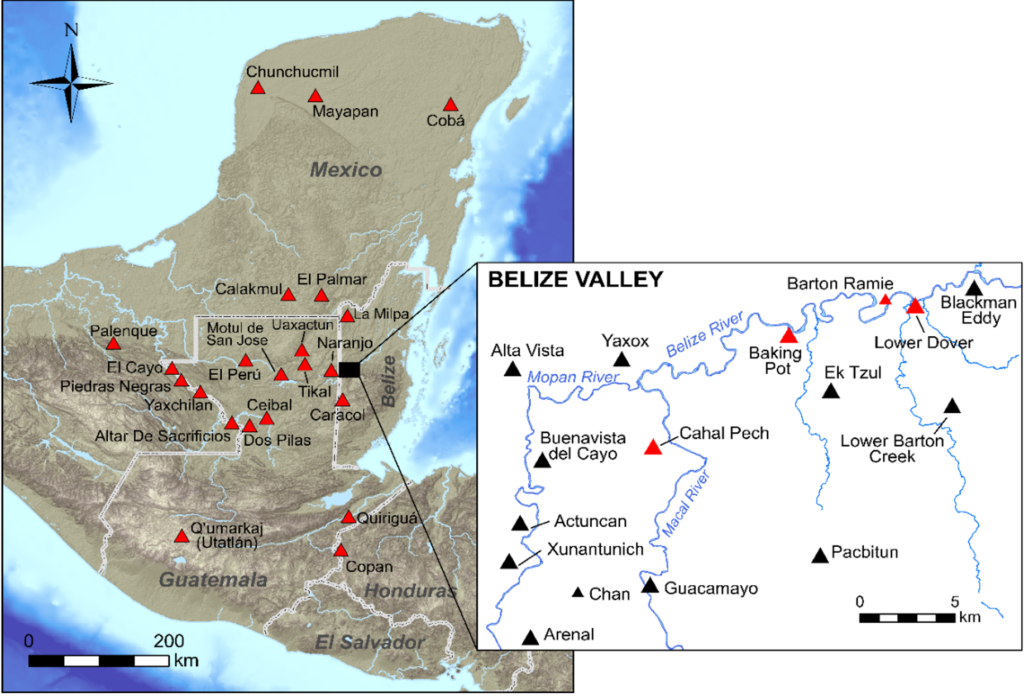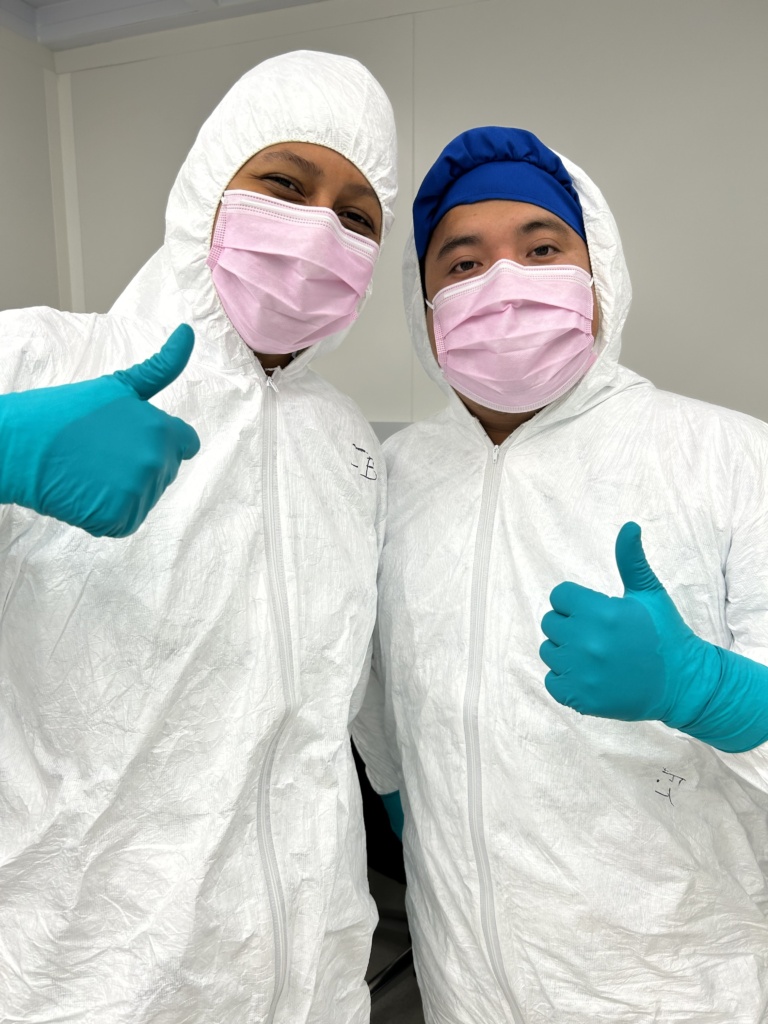
Project archaeologists Frank Tzib (left) and John Walden (right) working at the site of Lower Dover.
Reconstructing the lives and kinship networks of the Classic Maya

The Belize River Valley has a history of archaeological excavations stretching back more than a century, making it one of the most intensely archaeologically studied regions of the Classic Maya. In combination with public outreach and early career researcher training in Belize, this project leverages this century of archaeological research and applies cutting edge technologies in paleogenomics, bioarchaeology, and stable isotope analysis to reconstruct a detailed picture of the lives of the
ancient Maya. The project explores the social and biological kinship relationships of all levels of Classic Maya society, from the commoners to the elites, and seeks to understand how marriage and kinship networks at sites across the valley, including Baking Pot, Cahal Pech, and Lower Dover, formed the basis of the region’s political power. Project partners include the Belize Valley Archaeological Reconnaissance (BVAR) project and the Heritage Education Network Belize (HENB).
Community Outreach and Events

The project began with canvassing to determine interest in the project by local Maya and other community members in villages and towns in the Belize Valley. Led by Frank Tzib and John Walden, interviews and surveys with community members found strong support and interest in the development of an ancient DNA project. As the project developed, site tours and educational workshops were organized to allow community members to see first hand the working being done and to interact directly with the archaeologists and scientists. In 2023, a community jute snail bake, organized in partnership with U Janal Masewal, helped kick off the project by bringing together local communities for a fun all ages event about the archaeology of the Classic Maya.

Over the course of the project, local high school students in Belize participated in summer excavations, local high school students in Massachusetts helped catalogue project samples, and undergraduate students from around the world joined the project field schools.
Early Career Researcher Training
In 2024, project partners Frank Tzib (Galen University) and April Martinez (HENB) joined the Warinner Lab for an extended internship in ancient DNA laboratory training and osteological collections management at Harvard University and the Peabody Museum. Together, they conducted lab work on project samples and gave public lectures about archaeology and heritage stewardship in Belize.

Project team member and postdoc Rodrigo Barquera at the Max Planck Institute for Evolutionary Anthropology has special expertise in recovering highly degraded DNA from challenging tropical environments. His work on the project has led to the successful recovery of ancient DNA from more than 400 ancient Maya from sites throughout the Belize River Valley.
Ongoing Research
Research for the project is ongoing and involves multiple research partners and collaborators. Genetic data generation and analysis is well underway at Harvard University and the Max Planck Institute for Evolutionary Anthropology, and Douglas Kennett at the University California at Santa Barbara (UCSB) is leading the radiocarbon dating arm of the study that is essential for dating the reconstructed genomes from the project. Frank Tzib and John Walden have conducted several seasons of fieldwork with support from the Rust Family Foundation, and collaborators Antonio Beardall, Rafael Guerra, Jorge Can, Jorge Castellanos, Victoria Izzo, Kasey Corey, Saige Kelmelis, Julie Hoggarth, Carolyn Freiwald, and Jaime Awe are conducting vital research that will help inform the results of the study.
Update: On May 15, 2025 National Science Foundation funding for the project was terminated. It was one of more than 900 Harvard federal research grants terminated as part of an ongoing legal battle between the Trump Administration and Harvard University. We are currently looking for alternative funding sources to complete the project.

Project Fun Facts
In addition to being a student archaeologist, Frank Tzib is also a skilled artist working to preserve his native Yucatec Maya language and culture. Frank has produced commissioned reproductions of Classic Maya art and hieroglyphic inscriptions for archaeological sites and exhibitions in Belize, and he also runs a small business, Aj Tzib Masewal, making handcrafted art inspired by the Classic Maya. Growing up in the village of Oxmul Kah (also known as San Antonio) in Cayo, Belize, Frank has lived around archaeology all his life, and now he is making his mark as an early career archaeologist specializing in the Classic Maya. Frank was featured in the PBS special “Ancient Maya Metropolis”, and his archaeological research at the sites of Lower Dover and Ek Azul is helping to reveal the lives of the Maya who lived there more than a thousand years ago.
April Martinez is the Living Heritage Officer of Social and Cultural Research at the National Institute for Culture and History in Belize, and she holds a Master’s Degree in Archaeology from the University of Leiden (Netherlands), with a specialty in human osteology. April is a co-founder of the Heritage Education Network Belize (HENB), and she is the co-host of “Open Your Eyes“, the premier morning TV program in Belize.

John Walden has worked on archaeological projects in Belize since 2012 and he is the Assistant Director of the Belize Valley Archaeological Reconnaissance Project (BVAR). After earning his PhD from the University of Pittsburgh in 2021 and completing postdocs at the Max Planck Institute for Evolutionary Anthropology in 2022 and at Harvard University in 2024, John will join the archaeology faculty of Galen University in 2026.

Before earning his PhD from the University of Jena in 2022, Rodrigo Barquera worked for many years in a clinical laboratory in Mexico City that used genetic testing to match organ donors and recipients. His work in immunogenetics and love of history inspired him to change career paths, and he is now a leading expert on the archaeogenetics of ancient Mesoamerica.
Christina Warinner‘s archaeology career began in Belize more than two decades ago, when she signed up as an undergraduate to attend a BVAR field school in 2001. Since then, she has worked all over the world, but she is thrilled to now be working again with many of the same people who first inspired her career in archaeology.